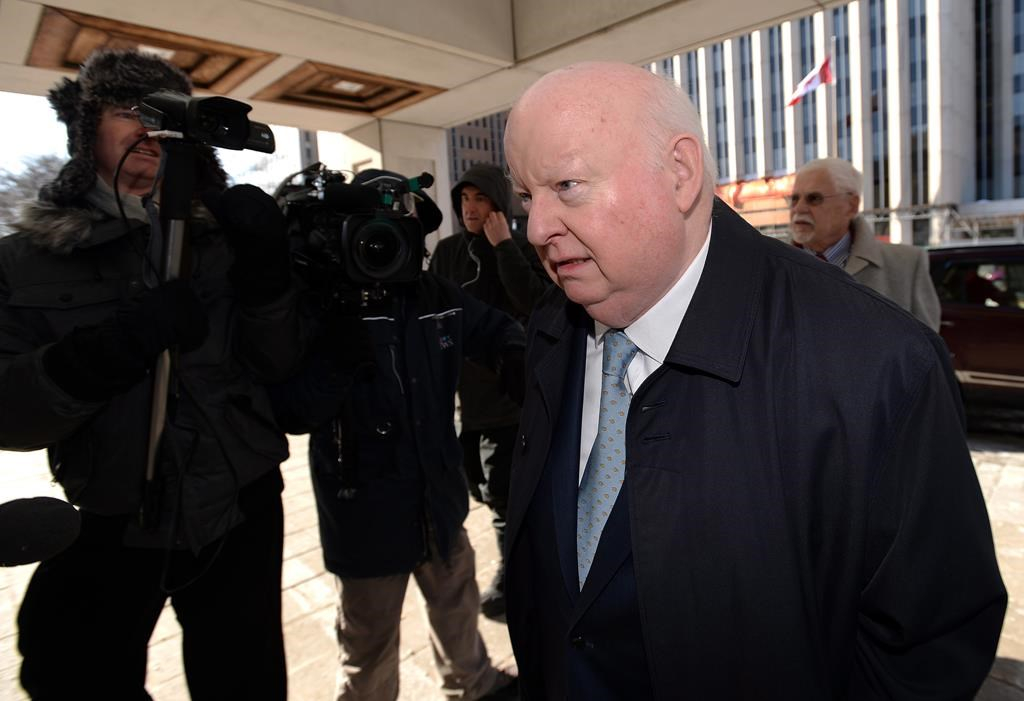Support strong Canadian climate journalism for 2025
Mike Duffy played fast and loose with both the facts and taxpayer dollars for the sake of his own reputation, the Crown argued Monday as the controversial senator's trial on fraud, breach of trust and bribery charges entered its final days.
Both the Crown and Duffy's defence team have now submitted hundreds of pages spelling out their lengthy closing arguments about the 31 charges he faces.
They are using the time on their feet in the Ottawa courtroom to hammer home some key points before Judge Charles Vaillancourt considers the 61 days of testimony he's heard since last April.
Crown prosecutor Mark Holmes, however, suggested Vaillancourt should review Duffy's own testimony with some trepidation, noting the number of times the accused dodged direct questions on the stand, contradicted himself and even admitted to exaggerating facts as part of his long career as a broadcaster.
"It may work in broadcasting," Holmes said, " but it is outrageous for a witness to do that at a criminal trial."
But, Duffy's lawyer rebutted later in the day, the defence in a criminal case isn't the one who has the onus of proving the charges.
"Reasonable doubt arises independent of accused's evidence," Donald Bayne said.
"To hear the Crown talk, Sen. Duffy has to make his case. His evidence simply confirms other evidence in this case."
Duffy, who has pleaded not guilty to all 31 charges, has claimed throughout the trial that he was operating under a Senate expense system saddled with complex rules and lax oversight. His decision to accept a $90,000 cheque from an official in the former prime minister's office — for which he's charged with bribery and corruption — was one made under duress by a government bent on protecting itself, his lawyer has argued.
Crown prosecutor Jason Neubauer took on the task Monday of explaining the complex bribery charges — many observers have wondered how Duffy could be charged with accepting a bribe while those who allegedly offered it were never charged themselves.
Neubauer said Duffy controlled the process of getting the eventual $90,000 from Nigel Wright, the former prime minister's chief of staff, by setting the conditions under which he'd repay living expenses and housing claims. It was Duffy, Neubauer argued, who first floated the idea he wanted someone to give him the money to repay, not the other way around.
Duffy demanded approval of the media lines, wanted assurances that he'd still be eligible to represent P.E.I. and to be kept out of a broader Senate audit, Neubauer said. The Prime Minister's Office just wanted it to go away.
"Sen. Duffy's actions were driven by a desire to protect and advance his own interests," Neubauer said.
Several of the charges Duffy faces relate to a $65,000 Senate-approved contract he had with a friend's company and the fact that money was then used to pay for smaller contracts, rather than have those services run through the Senate approval system.
Among them were payments for makeup services — something the Senate had already said it wouldn't cover — as well as a cheque for a volunteer who thought she was working for free and money for his personal trainer.
Holmes characterized the money as coming from a "slush fund" deliberately set up by Duffy to get around the Senate finance structure.
Senate oversight of that system was impossible, Holmes said.
"You can hardly be faulted if you are essentially tricked or deceived," Holmes said.
Duffy's lawyer will present his final thoughts in the case on Tuesday.
Stephanie Levitz, The Canadian Press


Comments